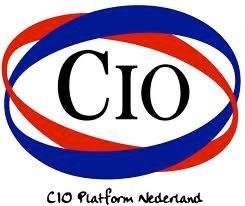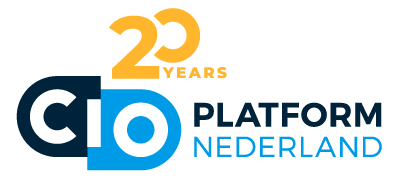Anniversary Blog I | Peter Hagendoorn
In this first ‘Anniversary Blog’, ahead of our Annual Day on June 5th where we will celebrate our 20th anniversary, former chairmen look back on their time, experience and the association's development. In this first blog, you will read the perspective of Peter Hagedoorn, former CIO and one of the founders of the CIO Platform Nederland.

Position of the CIO
Along the way, two more points were added. At the time, there was a lot to do about the position of the CIO. First, of course, was the question of how serious the position actually was. In many organisations, the CIO, usually at most then called IT Director, was not always taken seriously administratively. Yes, he or she could decide on the purchase of a new computer or software, but participating in discussions about the business processes or how to optimise IT to make the company more efficient was often not an option. So it was important for us, by setting up the CIO Platform, to encourage colleagues to join the CIO club and jointly try to strengthen the position of the CIO. At the same time, there were discussions as to whether the CIO should not actually also sit on the Executive Board and whether the reporting line to the CFO was the right one. In short: we were keen to better position the CIO as an officer and draw attention to the importance of IT for the organisation. The third issue at stake was the position towards IT suppliers, as well as the government. As an individual, you can hardly make a fist against the big IT suppliers. All too often, you faced contracts that you did not actually agree with and all responsibility was pushed away by the IT suppliers. Most IT suppliers then also pointed to their mostly American parent companies and indicated that the leeway to change a contract was virtually nil. But as a group, we thought, perhaps more could be achieved. After all, if ‘all’ companies and their CIOs in the Netherlands showed their disagreement with terms of delivery, the sums involved were considerable and involved the entire Dutch IT market. In addition, it also seemed useful to have more structured consultations with the government. After all, both the government, and the IT demand side of companies could jointly make a stronger fist to the IT companies.
- Get an idea of the above considerations at the time in this interview (Dutch) with Peter from 2005.
First form of the association And finally, armed with these basic principles, we formed an initial board with, I believe, Rob Nout, as Treasurer, Gert Jan van der Leer as Secretary and Richard van Breukelen and John Froger as members. Worth mentioning are two other organisations that helped us a lot with the start-up. First of all, of course, the ICT Media Group led by Rob Beijleveld. Through its CIO Magazine and many meetings for CIOs, the CIO Award ceremony and so on, ICT Media has been an important driving force in firmly positioning the role of the CIO, as well as in developing the personal skills of the CIOs. After all, learning to present, participating in working groups, writing articles, it all contributes to the development of the CIO and his skills. To this day, the function of ICT Media and the CIO Magazine is, in my opinion, important especially in the external positioning of the CIO. The second organisation that partly played an initiating role in the early days was EXIN. Of course, in the first period in 2003, CIO Platform Nederland had neither administration nor employees. EXIN supported the administration for some time and also assisted CIO Platform by providing organisational help. Almost from the beginning, Foppe Vogd was loaned from EXIN to CIO Platform and was the first employee to come on board. He has been instrumental in setting up the organisation through numerous activities such as setting up working groups and writing papers etc.
And finally, armed with these basic principles, we formed an initial board with, I believe, Rob Nout, as Treasurer, Gert Jan van der Leer as Secretary and Richard van Breukelen and John Froger as members. Worth mentioning are two other organisations that helped us a lot with the start-up. First of all, of course, the ICT Media Group led by Rob Beijleveld. Through its CIO Magazine and many meetings for CIOs, the CIO Award ceremony and so on, ICT Media has been an important driving force in firmly positioning the role of the CIO, as well as in developing the personal skills of the CIOs. After all, learning to present, participating in working groups, writing articles, it all contributes to the development of the CIO and his skills. To this day, the function of ICT Media and the CIO Magazine is, in my opinion, important especially in the external positioning of the CIO. The second organisation that partly played an initiating role in the early days was EXIN. Of course, in the first period in 2003, CIO Platform Nederland had neither administration nor employees. EXIN supported the administration for some time and also assisted CIO Platform by providing organisational help. Almost from the beginning, Foppe Vogd was loaned from EXIN to CIO Platform and was the first employee to come on board. He has been instrumental in setting up the organisation through numerous activities such as setting up working groups and writing papers etc.
European expansion
Besides CIO Platform Nederland, there were already CIO organisations in some other European countries at the time. By far the most important and best organised was (and still is) Cigref, the organisation of French CIOs. Of course, IT companies were not always happy with this maturing of CIOs, which were now starting to organise themselves in several countries. Therefore, a number of IT companies set up the CIO-net from Belgium. The objective was to organise CIO meetings in various countries in Europe, in order to bind CIOs to IT companies. CIO-net also came, so alongside CIO-Magazine, with its own CIO Award and, what made it attractive, without membership fees or the burden of administrative obligations. That while for the Platform, one has to pay membership fees. Several CIOs chose this ‘easy’ variant at the time. After my time at the CIO Platform, I joined the EuroCIO group set up by CIGREF, which aimed to bring together CIOs at European level. EuroCIO allowed CIO associations as well as individual CIOs of large European companies to become members. In 2011, the informal EuroCIO was transformed into a formal European Foundation under the name European CIO Association. Unfortunately, this organisation, whose main task was to organise European CIO meetings, consult with the European Commission on European legislation, in addition to consulting with IT suppliers at the European level, has not had ten years to exist. Internal discord, weak organisation in some countries, as well as the ‘dual’ membership structure (CIOs alongside CIO country organisations) eventually made it too complex and administratively unsustainable. However, I hope that ‘one day’ a fully-fledged European CIO organisation will emerge again, to play its role in the European IT developments of the future.
The Digital Future and the role of the CIO
Europe, including the Netherlands, faces ‘hard times’ in the IT field. After all, Europe has very few IT forces compared to the US as well as China. We therefore risk becoming totally dependent on technology from outside Europe. Yet there are opportunities and perhaps rather more in the application than in the basic products and services themselves. The AI field is still in a start-up phase but photonics and the quantum computer are also coming. Clearly, there are big efficiency gains to be made with AI. It is precisely in such areas that CIOs can be significant: Leveraging new technologies to ‘boost’ the organisation you work for. Where we see that in the US a number of tech billionaires have risen to the highest positions in national management, this is not yet the case in Europe. In Europe, too, more CIOs will have to rise to senior managerial positions in government and business. That's where you can make a difference. By smart application of new technologies like AI and by looking at governance structures through the lens of digital change management. Therefore, my plea was and still is: the CIO must develop into an all-round director armed with digital knowledge in order to guide own organisations, but also society, towards the digital future. That is the basic task of the CIO and this is the right time to ‘strike’ as a CIO community. Now that politicians are also realising that society cannot do without digitalisation and Europe has to build its own strength in this. Personally, I therefore think that the CIO Platform Nederland should make its voice heard more in the public debate on IT in government and society. And especially also in Europe. That voice against big IT companies is definitely of great value.
Peter Hagedoorn
Chairman CIO Platform Nederland 2004 - 2008
Share this post!
